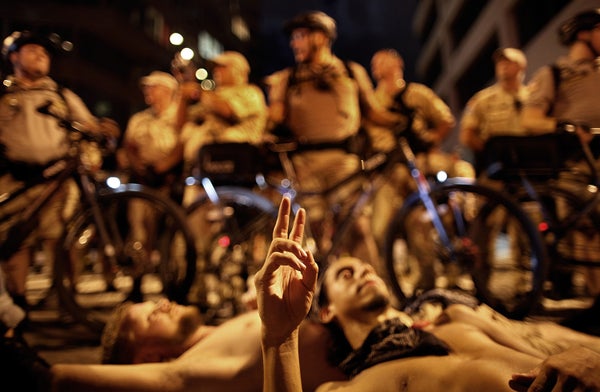CLEVELAND — The Republican National Convention is coming to town next week, and Dr. Robert Wyllie is ready with a binder 6 inches thick, crammed full of plans for dealing with any potential medical emergency.
He’s not alone.
Across both Cleveland and Philadelphia, where the Democrats will convene at the end of July, hospitals are girding for the presidential nominating conventions. Both cities can expect a slew of relatively minor problems: exhaustion, dehydration, misplaced medications, a delegate or two — or 20 — having too much to drink. Then there are the big fears: terrorist attacks, riots, shootings, fistfights.
On supporting science journalism
If you're enjoying this article, consider supporting our award-winning journalism by subscribing. By purchasing a subscription you are helping to ensure the future of impactful stories about the discoveries and ideas shaping our world today.
So hospitals are holding off on elective surgeries, asking trauma surgeons to defer vacations, and stockpiling enough equipment — including surgical tools, medications, and linens — to last 96 hours without resupply.
“At the suggestion of the Secret Service, we need to be able to act independently for four days,” said Wyllie, the chief medical operations officer at the Cleveland Clinic.
One of the biggest concerns: demonstrations that could turn violent.
Dr. Roger Band, an associate professor of emergency medicine at Thomas Jefferson University Hospitals in Philadelphia, said anxiety is particularly high after the Dallas shooting last week, when a sniper killed five police officers during a rally protesting the deaths of two black men at the hands of law enforcement.
“I think it’s obvious that the threat level, especially with higher-profile events like these, is increased quite a bit in the wake of what’s happened recently,” said Band, who has been involved in the hospital’s planning for the Democratic National Convention.
“Even at a major trauma center, getting five or six critically injured patients is an extraordinary undertaking,” Band said. “It’s labor- and resource- intensive to care for just one patient — so when you multiply that by five, or 20, or 200, you can very quickly overwhelm even an expert center.”
Past rallies for presumptive Republican nominee Donald Trump have sparked scattered violence, sparking intense preparation at the Cleveland Clinic.
“We know there’s probably going to be some public disturbance that will occur at the RNC,” Wyllie said. “We have to be able to think in advance of how we’d be able to handle a number of protesters who might need assistance, or police who might need assistance.”
Both Cleveland and Philadelphia will set up an incident command center, where a central authority will make top-line medical decisions in the event of an emergency. And hospitals are ensuring they’re prepared not only to handle a flood of patients, but also to transport them across the country if needed, because any given region can generally handle just a few hundred patients in intensive care, said Dr. Herbert Cushing, chief medical officer of Temple University Hospital in Philadelphia.
Training for disaster
The chief medical officers of Cleveland’s hospitals have been planning for about 15 months now, said Dr. Michael Anderson, chief medical officer of the University Hospitals of Cleveland. They will work together to ensure that an emergency room doctor is stationed at the Quicken Loans Arena, where the convention takes place, about 12 hours a day. Teams of paramedics will be there around the clock.
Local hospitals are also staffing a hotline that convention attendees can call to set up doctors’ appointments, get access to medications they may have forgotten, and learn which pharmacies are open.
Each hospital has also done its own prep: Cleveland Clinic has had six drills in the past four months to prepare for the RNC.
Some have simply been tabletop exercises — gathering 100 or so people in a room to cogitate over medical scenarios that might occur during the convention. More active drills also involve simulating shootings and other such casualties in real-time, tasking students and actors to pretend they’re injured patients.
In a real emergency, Cleveland Clinic could set up 150 new beds, Wyllie said, and treat an extra 1,000 patients.
The city’s hospitals also had a bit of real-world practice last month when the Cleveland Cavaliers won the NBA Championship: About a million fans partied downtown, and hospitals had to contend with issues like dehydration and alcohol poisoning — and ambulances that had trouble navigating the choked streets of Cleveland.
Of course, that was a different scenario, from both a medical and a law enforcement standpoint, Wyllie said — but the hospitals learned from that experience how to better mobilize emergency technicians.
Grim real-world practice
Over in Philadelphia, hospitals have become practiced in preparing for an event like the DNC, said Cushing. Last September, the pope came to Philadelphia — which was expected to be a dizzying affair for medical staffs.
“We’d had months and months of meetings with the Secret Service, Homeland Security, and regional health care planning authorities,” Cushing said. “But the crowds were very, very light, and there were almost no medical problems as a result of the papal visit.”
A more taxing test came with the deadly Amtrak crash in May of 2015, which killed eight and injured more than 200, including 54 who came to Temple for treatment.
“Before the wreck, the hospital was absolutely full — no beds left. So we had to quickly discharge patients, and move them to other hospitals,” Cushing said. “I don’t want to be in that position again.”
So Temple is making sure its trauma team is ready, keeping enough blood on hand, and trying to make sure the hospital isn’t packed with other patients during the convention.
“We’ve prepared for a really wide variety of scenarios,” said Band, the emergency medicine doctor. “I don’t even want to say what else. I don’t want to plant any seeds, or give anyone bad ideas.”
Republished with permission from STAT. This article originally appeared on July 12, 2016.
